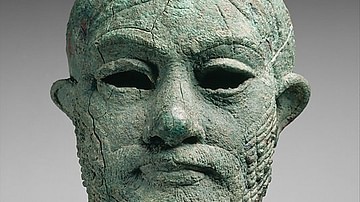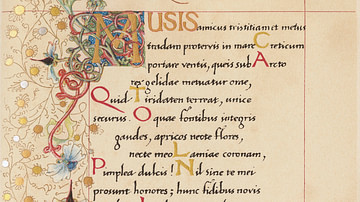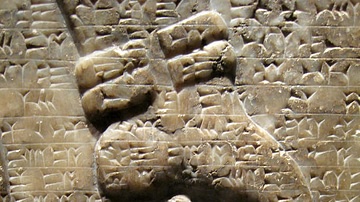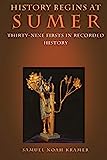A Praise Poem of Lipit-Estar is a Sumerian praise song honoring Lipit-Estar (also known as Lipit-Ishtar, r. c. 1870 to c. 1860 BCE), the fifth king of the First Dynasty of Isin, best known for his legal code written between the time of the better-known Code of Ur-Nammu and the later Code of Hammurabi.
The poem (also known as Lipit-Eštar A in modern scholarship to differentiate it from other poems concerning Lipit-Estar) would have been sung at festivals in ancient Mesopotamia honoring the king and the gods he served. These praise songs were often composed by the scribes in ancient Mesopotamia as though the king were speaking the lines themselves, and this poem conforms to that same paradigm. The king, as the head of Mesopotamian government, was expected to recognize his own worth as a steward of the gods, and so, as seen in this work, hymns of praise dispense with any semblance of modesty.
A Praise Poem of Lipit-Estar was composed during the king's reign, along with many others serving the same purpose, but took on a life of its own after his death as part of the curriculum of the Mesopotamian education system, known as the edubba ("House of Tablets"), and formed part of the Decad (ten compositions) a student needed to master before graduation. As an often-copied text, the work continued to be memorized and recited for over a century after Lipit-Estar's reign.
It continues to be anthologized in the present day as one of the more popular Sumerian praise poems, owing to its imagery and its historical value in illustrating the ideal of the perfect Sumerian king. Whether any king lived up to this ideal is unlikely, but works such as A Praise Poem of Shulgi suggest they were based, at least in part, on historical truth, even if aspects of a king's character and accomplishments may have been exaggerated. The purpose of such pieces, however, was not to present the king accurately but to praise him as a worthy steward of the gods and immortalize his reign in verse.
Lipit-Estar & Kingship
Lipit-Estar's name appears on the Sumerian King List (c. 2100 BCE with entries down to c. 1648 BCE), and his reign is documented through royal records and inscriptions. He was regarded as a good king who defeated the Amorites and secured his kingdom, but little else is known of him except for what is given in praise songs like this one and from the values expressed through his laws, the Code of Lipit-Estar (also given as the Code of Lipit-Ishtar) which dealt with subjects such as land disputes, public works and service, taxes, inheritance, and debt enslavement.
Like the earlier Code of Ur-Nammu (c. 2100-2050 BCE), issued under either Ur-Nammu (r. 2047-2030 BCE) or his son and successor Shulgi of Ur (r. 2029-1982 BCE), the Code of Lipit-Estar reflects a king presenting himself as a father figure to his people, gently correcting them when they go astray and instructing them through just punishments, usually fines, that fit the severity of any breach of the law. It differs significantly from the later Code of Hammurabi which mandated strict penalties, including dismemberment or death, for many infractions.
Lipit-Estar's law code, like that of any other Mesopotamian king from Ur-Nammu to Hammurabi, derived its authority, not from the monarch himself, but from the gods who had chosen him as their steward over the land and its people. Kingship in Mesopotamia evolved from the position of tribal chief to leader of a community or village to monarch of a kingdom by the time of the Early Dynastic Period (2900-2334 BCE). The authority of the king was understood to rest upon divine will and was only respected as long as it was clear the gods still approved of the job he was doing. Scholar Stephen Bertman comments:
To justify this greater power, the king would require a divine mandate, especially since he was no longer just the leader of a single community serving a local god but the master of a wider domain. One solution would be to claim he had been chosen by heaven, a claim that could be affirmed by the high priest of a nationally venerated temple such as the temple of the god Enlil at Nippur. Indeed, the king's evident success was the most convincing proof of his divine selection. Both that success and his choice by the gods would then be celebrated in poetry and song ... [these songs] were used to suggest divinity: references to the king's radiant aura or to his being the god's "son"; grand epithets, such as "king of the four quarters [of heaven and earth]"; and artistic devices [in art] such as portraying the king standing in a god's presence or making the king taller than the people around him. (66)
A Praise Poem of Lipit-Estar would have been composed to affirm the king's claim to divine approval, celebrate his stewardship, and link him directly to the gods through epithets and imagery or more directly by referencing him as a son of Enlil, the sky god who maintained order in the universe.
Summary
The poem begins with Lipit-Estar introducing himself as a son of Enlil, possessed of divine strength and beauty, and then develops the image of the perfect king through sections building on each other in the rest of the work. In lines 7-16, he compares himself to the divine Anzud Bird, a powerful creature whose beating wings were thought to cause storms, and to a wild bull, suggesting virility. Lines 17-42 boast of his relationship with the gods An (Anu), Enlil and his consort Ninlil, Nintud (Ninhursag) the great Mother Goddess, Nanna the moon god, Ninurta the warrior god (given here as Udta-ulu), Enki the god of wisdom, Nisaba the goddess of writing, and Utu-Shamash, god of the sun and justice. He also claims to be the husband of Inanna, the goddess of war, sex, and love. These sections establish the king's divine associations.
Lines 43-61 present the king as a provider for his people as well as the gods he serves as he is one "who cares unceasingly for the E-kur", the temple of a given god. He is depicted as a shepherd to his people, a farmer, a rushing river, all symbols of life and regeneration. He makes the crops grow and brings in abundant harvest, and enlarges the fish for the fisherman and the birds for the hunter. This section depicts the king as the servant of both the gods and his subjects, doing his best to provide for both.
Lines 62-97 emphasize his successful stewardship as he brings the "first fruits" to the temple and makes the holy cities of Nippur and Kesh abundant, claiming for himself the role of a purification priest. He presents himself as a caring father to his people but an enemy of any who would harm them. He also protects his people from themselves as he keeps them "on a straight path", a possible allusion to his law code.
The poem ends (lines 98-108) by depicting the king as Inanna's husband, able to satisfy the goddess sexually in the bedchamber, and repeats his initial claim as a son of Enlil. The last line of the poem, "It is sweet to praise me", suggests that the act of praising the king elevates the participant as much as it does the subject because one is recognizing all the good Lipit-Estar has done and is acknowledging his gifts with gratitude that elevates the heart.
Text
The following is taken from The Literature of Ancient Sumer, translated by Jeremy Black et al., and from The Electronic Text Corpus of Sumerian Literature, translated by the same. Ellipses indicate missing words or lines, and question marks suggest an alternate interpretation of a word.
1-6: I am a king treated with respect, good offspring from the womb. I am Lipit-Estar, the son of Enlil. From the moment I lifted my head like a cedar sapling, I have been a man who possesses strength in athletic pursuits. As a young man I grew very muscular (?). I am a lion in all respects (3 mss. have instead: to the extremes (?)), having no equal.
7-16: I am a gaping dragon, a source of great awe for the soldiers. I am like the Anzud bird, peering about in the heart of the mountains. I am a wild bull whom nobody dares oppose in its anger. I am a bison, sparkling with beautiful eyes, having a lapis-lazuli beard; I am ... With my kind eyes and friendly mouth, I lift people's spirits. I have a most impressive figure, lavishly endowed with beauty. I have lips appropriate for all words. As I lift my arms, I have beautiful fingers. I am a very handsome young man, fine to admire.
17-22: I am Lipit-Estar, king of the Land. I am the good shepherd of the black-headed. I am the foremost in the foreign countries and exalted in the Land. I am a human god, the lord of the numerous people. I am the strong heir of kingship. Holding my head high, I am established in my position.
23-32: I am An's purification priest with purified hands. An placed the great and good crown firmly on my head. Enlil gave the scepter to me, his beloved son, in the Ki-ur. I am what makes Ninlil happy: she determined a good fate in the Ja-jic-cua. I have been made excellently beautiful by Nintud, the joyful woman, in brick-built Kesh. I am one looked on favorably by Nanna: he spoke to me affirmatively in Ur.
33-42: Udta-ulu imbued me, the man of his heart, with great awesomeness in E-cu-me-ca. I am he on whom Enki has bestowed wisdom: he gave me kingship in Eridu. As the beloved husband of Inanna, I lift my head high in the place Uruk. I am a proficient scribe of Nisaba. I am a young man whose word Utu confirms. I am the perfection of kingship. I am Lipit-Estar, Enlil's son.
43-50: I am he who makes an abundant crop grow, the life of the Land. I am a farmer, piling up his grain piles. I am a shepherd making fat and milk abundant in the cow-pen. I am he who makes the fish and birds grow bigger in the marshes. I am a river of plenty, bringing flowing water. I am he who increases the splendor of the great mountains. I have been given enormous strength by Enlil. I am Lipit-Estar, his young man who respects him.
51-61: I am the provider of the gods. I am he who cares unceasingly for the E-kur. I am the king clutching a kid to the breast as a gift. I pray in all humility. I am a king standing in prayer. I am he who speaks friendly words to appease Enlil. I am he whose prayers make Ninlil happy. I am he who serves Nuska indefatigably. I am he who is ever praying (?) at the Ki-ur. Bestowing many things, I am perfect for the foundation (1 ms. has perhaps: city). I am one who always hurries, but whose knees never tire.
62-70: Bringing first fruits, I do not pass by the E-babbar. I am he who records abundance for Nippur. I serve Kesh as its purification priest. I am first-rate fat and first-rate milk for Ur. I am indefatigable with respect to Eridu. I am he who increases the food offerings for the place Uruk. I am he to whom life was given in the E-kur. I am he who desires liveliness for his city. I am Lipit-Estar, the shepherd of all foreign lands.
71-81: I, the king, am like pounding waves in battle. Girded in manliness, I never loosen my harness. I am he who sharpens his dagger. In battle I flash like lightning. A firm foundation, I repulse the troops. I am a sajkal stone, a pecpec stone. I am a siege shield, a screen for the army. A clear-eyed warrior, I make the troops firm. I am Lipit-Estar, Enlil's son. Like a waterskin with cool water, I am life for the young men. Keeping my eyes on the road, I am the protection (1 ms. has perhaps: the aid) of the soldiers.
82-92: I am a king who, as he sits, is fitted for the throne. I am possessed of a weighty persona for speaking. I am one with a far-reaching mind and intellect, examining requests. I do not hurry over anything but research its background. I have a far-reaching heart and broad wisdom. I am a stone that brings ... out of the Land. I am one that has truth in his mouth. I am one who never destroys a just person. I am a judge who, in making a decision, weighs his words fairly. I am one who is well-acquainted with giving orders to the foreign lands. I have established justice in Sumer and Akkad and made the Land feel content.
93-97: What of my truthful things can be thrown away? I, prince Lipit-Estar, keep the people on a straight path. As regards my integrity: in what respect have I ever been idle? I am a strong person who has brought distinction to everything. I am Lipit-Estar, Enlil's son.
98-108: In my royal palace, my holy and good residence, my spouse holy Inanna made firm the foundation of my throne. She will embrace me forever and eternally. I will spend all day for the Mistress in the good (1 ms.: lapis-lazuli) bedchamber that fills the heart with joy! I am Lipit-Estar, the powerful heir; I am the king that makes justice prominent. May my name be called on in all the foreign lands! I am Lipit-Estar, Enlil's son. It is sweet to praise me.
Conclusion
The poem, as noted, had a long life as part of the Decad in the scribal schools, continually copied long after the king's reign, but it was not unique. In form, its progression resembles that of the Kesh Temple Hymn, which moves through eight sections praising Ninhursag and her temple in the city of Kesh; just as this work does in separate sections in praise of the king. The form and some of the imagery are also comparable to that of the hymn Enlil in the E-kur, written praise of Enlil, Ninlil, and the temple at Nippur. There are also many other works fitting the same form and written for a similar purpose, as Jeremy Black observes:
All of these tropes of good kingship can be found in other royal praise poems – A Praise Poem of Shulgi is a case study in both piety and bodily athleticism; A Love Song for Shu-Sin [the world's oldest love poem] has Inanna lusting for the king; An adab to Nergal for Su-ilisu is addressed to the warrior god Nergal for help in battle – but no other paints such a clear and rounded portrait of the ideal ruler as A Praise Poem of Lipit-Estar. This may have been one of the reasons for its durability within the school canon; in Nippur it was copied until at least the 1740s, some two centuries after the king's reign. Its scholastic function then was probably not so much to memorialize a long-dead ruler from a long-defunct dynasty but to instill into the trainee scribes the values and ideals of Mesopotamian kingship. (308)
While this is no doubt true, the poem also served the same purpose as many of the works of Mesopotamian literature: to preserve the memory of the past for future generations. The details of the reign of Lipit-Estar have been lost, but his name is still remembered through the songs written in honor of the great king who was a shepherd to his people and loved by the gods.













